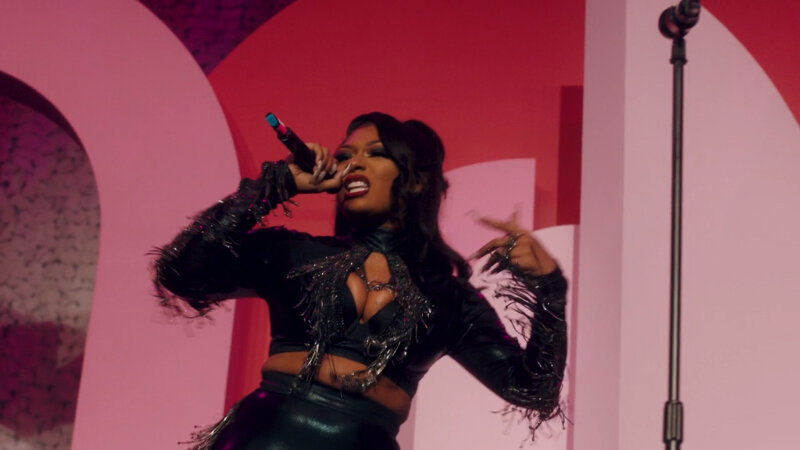JoJo Siwa, of “Dance Moms” and Nickelodeon fame, has attracted the spotlight again this spring with an announcement that she’s pioneering gay pop. The actress and dancer, who identifies as pansexual, has previously appeared in “The Fruitties Are Back” (2022), “Kung Fu Sock” (2022), “The Angry Birds Movie 2” (2019) and “Siwa’s Dance Pop Revolution” (2021). On April 5, 2024, she released her latest project, a pop single accompanied by a music video titled “Karma.”
Chelsea Wolfe gets weird on ‘She Reaches Out to She Reaches Out to She’
Chelsea Wolfe is an artist who has done a bit of everything, from collaborating with metalcore band Converge and dark folk act King Dude to co-writing the soundtrack for the 2022 horror movie “X” starring Mia Goth. Now, Wolfe has released her seventh album, “She Reaches Out to She Reaches Out to She,” which came out on Feb. 9. The album combines the stylings of early Grimes’ electronica with those of Mitski’s emotional depth.
'One More Time': Blink-182 returns to the old days
Pop-punk is back.
In the past two years, Paramore, Simple Plan and Taking Back Sunday have all released full-length albums. Say Anything, Green Day, Busted and Hawthorne Heights are coming out with new songs. Amidst the revival of a genre they helped pioneer, it only makes sense that Blink-182 would come back as well — though, to be fair, they’ve been consistently releasing since 1994.
Mitski explores loneliness, grief, and approval in seventh studio album
Mitksi’s music manages to encapsulate universal emotions in two or three minutes. She uses simple metaphors and beautiful music to represent things that can’t quite be captured in words, which is likely what inspires the undying devotion of her fans. Arguably, there’s not a person alive who can listen to a Mitski song and not relate in some way. Beyond simply inspiring empathy in her listeners, Mitski makes pain feel precious, longing feel divine, and happiness feel infinite.
‘Nadie sabe lo que va a pasar mañana’: The Return of Trap Bunny
boygenius releases first full-length album, ‘the record’
New Yo La Tengo album looks frankly at the state of the world
Yo La Tengo, a New Jersey-based band founded in the 1980s, released their 17th album, “This Stupid World,” in February. The album’s nine songs trace topics such as aging, death, and perseverance. Photo courtesy of Ricardo Romanoff via Flickr.
By Lucy Oster ’23
Arts & Entertainment Editor
I am always wondering if life is either good or bad — a reductive way of looking at the world, but I can’t help it. Lately, I’ve been reluctantly settling on the latter, as romantic heartbreak looms eternally and trains tip and spill poison. When I feel like this, I turn to people with years on me, who have seen so much bad and good that they’ve learned to take the two extremes with a grain of salt, knowing it can all change so quickly.
“This Stupid World,” released on Feb. 10, is the 17th album from New Jersey-based band Yo La Tengo. Clocking in at nine songs, a respectable number for an objectively late-career release, “This Stupid World” does not blow up the Yo La Tengo sound established on prior albums such as their previous 2018 album, “There’s A Riot Going On,” in any way, and that can be appreciated in a world that can be so destructive otherwise. After all, how can artists remain authentic and produce something unorthodox if they’ve spent decades consistently releasing albums? Specifically, how can an independent rock artist continue writing music about love and sadness, the most obtuse yet overdone topics? The answer to these questions has yet to be discovered, but it’s clear that Yo La Tengo has a clue, and their new album can help steer you through the messy nuances of life.
The album starts as expected for an indie rock band: with a lot of messy guitar and a steady drumbeat. Yo La Tengo formed in the 1980s, and this will likely affect their music style for as long as they produce it, with rougher-sounding musical attributes and soft vocals defining the band. These sounds are present on the new album, and especially in the two first songs on the album, “Sinatra Drive Breakdown” and “Fallout.” The songs on “This Stupid World” are generally lyrically lean with longer musical interludes. The lyrics that do emerge are poignant to many aspects of life. The album, after all, has a title that seeks to define the world, and the band has certainly been around the block.
“Fallout,” the first single and the album’s most-played song on Spotify, is about a desire to “fall out of time” because “every day it hurts to look.” The sentiment is not positive, but it’s delivered in an honest tone. As I listen to the song, I cannot always disagree with the desire to fall out of time briefly, and I feel relieved that I am not so alone in it.
Much of the album seems to cover aging and even death. “Until It Happens,” asks the listener to “Look away from the hands of time” and even “Prepare to die.” The last song on the album, “Miles Away,” wisely remarks: “The pain creeps in anyhow / You feel alone / Friends are all gone / Keep wiping the dust from your eyes.” The “keep” in the action of wiping the dust from your eyes is key to “This Stupid World.” Consistency and keeping on will change one’s perspective on life from bad to good and back again forever until it all ends.
Nuance is everything in this stupid world, and everything in “This Stupid World” as well. The songs are sonically harsh with soft lyrics, and the meaning behind the lyrics is full of nuance as well. “Sinatra Drive Breakdown” has the lyric “I see the moon rise as the sun descends.” Change is the only constant that we can rely on. Still, not all of the songs on the album are so bleak, as not all aspects of life are. “Tonight’s Episode” is bouncier than the other songs in Yo La Tengo’s repertoire, with fun lyrics about walking dogs, milking cows and the Japanese dish Shabu-shabu. Vocalist and guitarist Ira Kaplan even remarks, “I’ll show you a yo-yo trick.” Kaplan and one of the other members of the three-person band, Georgia Hubley, are married, and that domesticity shines through in “This Stupid World.” Married life also appears on the album in sadder ways, such as the song “Apology Letter,” where Kaplan sings, “If I were to smile at you / Would you smile at me?”
At the beginning of “Aselestine,” the second single, Hubley chuckles in the song’s prelude before sharing a gentle song. The lyrics are not sweet, proclaiming, “Where are you? / The drugs don’t do / What you said they do.” Yet, the tone is lifting and a release from the sonically harsher noises. Here, Yo La Tengo demonstrates that a compositionally soft song can encompass some of the bleakest lyrics, the opposite of their usual mode of louder songs and sweeter lyrics.
“This Stupid World” reveals that we cannot separate the bad and good from life. They are intricately tied up together, and they both make the other stronger with their contrast. I can, and even have to, appreciate both if I want to enjoy living even a little bit. After all, as the album’s titular song says, “This stupid world / It’s killing me / This stupid world / Is all we have.”
The Backseat Lovers releases new album
The Backseat Lovers, an indie-rock band from Utah, has done the seemingly impossible and solidified themselves as a timeless band in an age where much music, specifically indie, can sound like the echoes of its predecessors, lacking the creation of anything groundbreaking. Formed in 2018, the band appeals to a younger generation thrust into the uncertainty of a world turned upside down, experiencing the bittersweet and precarious nature of growing up. The Backseat Lovers — Joshua Harmon, lead singer and guitar; Jonas Swanson, guitar; KJ Ward, bass; and Juice Welch, drummer — embody exactly what it means to be a kid-turned-adult in a world that isn’t quite prepared for them.
‘The Car’ officially marks the Arctic Monkeys’ shift toward a new sound
The Arctic Monkeys, a rock band from Sheffield, England, is perhaps best known for revolutionizing the English music scene, beyond rock, in the late 2000s and early 2010s. Akin to “Beatlemania,” the influence the band had on garage rock permanently shaped the production of rock music. With the release of “AM” (2013), their fifth studio album, fans recognized the band as an instant classic, with the album representing the coolness of revived indie rock that the band became known for.
In ‘star-crossed,’ Kacey Musgraves shows she isn’t a typical country singer
“Let me set the scene / Two lovers ripped right at the seams,” country music star Kacey Musgraves sings in the first lines of her recently released fourth studio album, “star-crossed.” In this opening track, Musgraves outlines her marriage falling apart — from the painful split from American singer-songwriter Ruston Kelly, to the divorce itself, to finally breaking free from the hurt.
Lorde returns with the song of the summer and announces new album
A Queer Analysis of ‘MONTERO (Call Me By Your Name)’
Sounds of MoHo Playlist: January Edition
We asked Mount Holyoke students to tell us which songs dominated their playlists and which artists they had playing on a loop all January. These were the results!
Top Songs:
Driver’s License by Olivia Rodrigo
Good Days by SZA
Fallin' (Adrenaline) by Why Don't We
Top Artists:
Taylor Swift
Hozier
One Direction
Songs that made the cut:
Honey by Mariah Carey
drivers license by Olivia Rodrigo
Maniac by Conan Gray
Fracture by Stephen Moccio
Girl Almighty by One Direction
Diana by One Direction
Wonder by Shawn Mendes
Falling by Harry Styles
Two Birds by Regina Spektor
Cold by Marc E. Bassey, Buddy
Scan this code to find the Sounds of MoHo playlist.
Spotify Warped?: Students Find Shortfalls in Algorithm
By Mariam Keita ’24 and Rose Cohen ’22
Section Editor and Staff Writer
Last Tuesday, Dec. 1, the Swedish audio streaming service Spotify released their yearly Spotify Wrapped personalized experience, which tells eligible users about their top artists, top songs and minutes listened. In order to receive Wrapped, listeners would have needed to have an account before Nov. 15, listened to at least five different musicians and 30 different tracks.
“I’ve seen people bond over music all the time and I think it’s a really beautiful thing because music is a universal language,” Tiwani Ariyibi ’24 explained, when asked about the music streaming platform’s annual feature. “Spotify Wrapped can build a community around your favorite artist which I think is really nice, even if the algorithm is a little messed up.”
Ariyibi, like many subscribers, enjoys the Wrapped feature. However, she was not necessarily satisfied with this year’s summary of her listening habits.
This year, the creator of the Broadway musical “Hamilton,” Lin-Manuel Miranda, appeared among her Spotify Wrapped artists.
“I really liked the [Hamilton] movie and I would play [the soundtrack] a lot, but that was a phase. It lasted like a solid month and then I never went back,” Ariyibi explained.
Mae Philippe-Auguste ’24 was also surprised by her Spotify Wrapped this year.
“A lot of my stuff also came from my sleep playlist so I didn’t even bother posting,” Philippe-Auguste wrote in response to an Instagram story about this article.
Students in the class of 2024 listened to a good deal of sad music, according to Pearl Young ’24.
“People started listening to emo music that was popular when we were younger,” she said. “I saw a lot of people in our class had Mitski [sic] somewhere in there [sic] top 10.”
Ariyibi poses one theory as to why so many people had such wistful sounds in their Wrapped this year. “In a pandemic, you can’t really see your friends or family — things that would normally bring you comfort — and you have to find new ways [of coping].” Additionally, Ariyibi explained that Spotify users are turning to the artists that they listened to in their childhood. “I listened to a lot of Lauryn Hill [which] my mom used to play when I was younger,” Ariyibi said.
Joliet Morrill ’21, who has approximately 12,000 Spotify followers and creates Spotify playlists for her Tik Tok followers, suggested that people are returning to their old favorite songs for a sense of nostalgia. “[They want to] remind themselves of a different time,” Morrill said.
Since 2020 began, Morrill found that Tik Tok users have been requesting mood-based playlists. “I have to create a story by giving the playlist an interesting title and cover,” Morrill explained.
Erica Weathers has noticed similar trends while working as a Clinical Social Worker for Mount Holyoke College Counseling Services.
“Many students that I work with use music as a way to self-soothe and relax or distract themselves from stressful emotions and to uplift their spirits. I also have had students that struggle with ADHD listen to relaxing music in the background while they're doing their work which provides just enough stimulation that can help them focus,” Weathers said.
“If I had to guess about why students are listening to music from earlier stages of their lives, my best guess is that the music they listened to when they were younger can trigger positive memories and associations,” Weathers added. “The music is something that is known to them and in that way, can bring comfort during a time of great uncertainty.”
Philippe-Auguste seemed to fit into this trend of listening to old music. “I’m a theater kid so songs from shows that I’ve been in, [they remind] me of my cast,” Philippe-Auguste explained. “I think it just takes you back to these good memories and people that you can’t necessarily connect with as much right now.”
Ariyibi thought the comeback of childhood music-related well to the year 2020. “I don’t think I can find someone who is happy about this year. Sometimes you just need music to help you cope through anything you’re going through and I think that’s why a lot of people had depressing music,” Ariyibi said.
Cardi B and Megan Thee Stallion’s Sex-Positive ‘WAP’ Goes Viral
Pictured Above: Cardi B (left) and Megan Thee Stallion (right)
By Sabryna Coppola ’22
A&E Writer
Being in quarantine this summer has brought us some great music (and subsequently some great TikTok dances), and Cardi B and Megan Thee Stallion’s duet “WAP” made a huge splash. The song spent two weeks at No. 1 on the Billboard Hot 100 list and has become an instant hit, breaking 93 million streams in its first week. “WAP” has received tons of support from fans of Cardi B and Megan Thee Stallion, but has also drawn the attention of conservative public figures weighing in with their opinions.
The song itself is a sexy, boisterous anthem, celebrating sexuality for anyone with a “WAP” (wet ass p----). The song opens with a sample from Frank Ski’s song “W----- in This House,” looping throughout the song and setting the tone right away. The lyrics are explicit and detailed, putting euphemisms and double entendres to brilliant use.
The music video is visually striking and iconic in its own right, using water to double down on the message, and other symbols of prowess — like tigers — to denote the fierce attitude and intentions of the performers. The video was choreographed by JaQuel Knight who is also known for his work with Beyoncé.
Personally, I loved the song. I love the message, the honest celebration of women’s sexuality and the bold self-awareness of “WAP.” The song has received a lot of attention on the social media app TikTok, sparking a viral dance choreographed by Brian Esperon for viewers to partake in. TikTok influencers, parents and church groups alike have used the song to record their own rendition of Esperon’s dance, embarrass their kids or make up their own parodies.
However, not everyone had such positive feelings about “WAP.” Most notably, political pundit Ben Shapiro made a video on his YouTube channel dissecting the lyrics and reacting to the song. He read the lyrics in his signature monotone, adding his own commentary, which later would inspire remixes with the song performed in his voice. He mocked the song, implying that the sexual confidence portrayed by Cardi B and Megan Thee Stallion would only lead to further objectification of women, and gave the opinion of his wife, a doctor, who apparently advises people with “WAP” to see a doctor.
This response is rather unsurprising from the likes of Shapiro, but parents and critics have denounced the sex-positive anthem as well. The National Review describes the song as “hoary sexual cliches and deification of lowlifes in a music-video milestone,” demonizing both artists for their pasts and shaming them for their sexual content.
This song does what so many songs have done for men in the past. Singing and rapping about sexual prowess is nothing new for men in the music industry. What makes it a problem in “WAP,” besides the fact that it’s two women singing? American culture embraces the sexuality of men while suppressing the same sex positivity for women. The layer of respectability politics overlaid only proves the point more: Rapping about sexuality is only okay when it’s a man, forget two women of color.
Negative reviews and slut-shaming aside, the song has generally been embraced by audiences around the world. It has already been nominated for MTV’s Song of the Summer award, and its star status doesn’t seem to be subsiding. “WAP” makes it clear it is a song made for female empowerment. Its adoration on TikTok makes its generally positive reception obvious, mirroring the popular use of songs by ppcocaine (or Trap Bunny Bubbles) known for their sexual content and inspiring many viral dances.
The National Review writes, “This wanton spectacle is praised as ‘sex positive’ by college-grad journalists who’ve never known any sexual propriety (or the deliciousness of restraint).” The author seems to miss the point that the song was not created for them, or anyone else, but that it’s a form of self-expression and a celebration of the artists’ bodies. As myself, a “college-grad journalist” — if the shoe fits...
Sammy Rae talks origins, influences and the Friends, announces upcoming performance at Mount Holyoke
Kanye breaks ground and bread with new album
Nostalgic music biopics take Hollywood by storm
The Lumineers evolve sound on haunting new album “III”
Billboard rejects “Old Town Road,” igniting genre controversy
BY EMILY ROLES FOTSO ’21
20-year-old Montero Lamar Hill, better known by his stage name, Lil Nas X, has had an eventful few months. It all started with the release of his nowfamous single, “Old Town Road,” in early December. The song was released during the rise of what many call the “Yeehaw Agenda,” a meme that blends cowboy aesthetics with mainstream humor, and bends genres to create what Hill himself calls “country trap.”




















